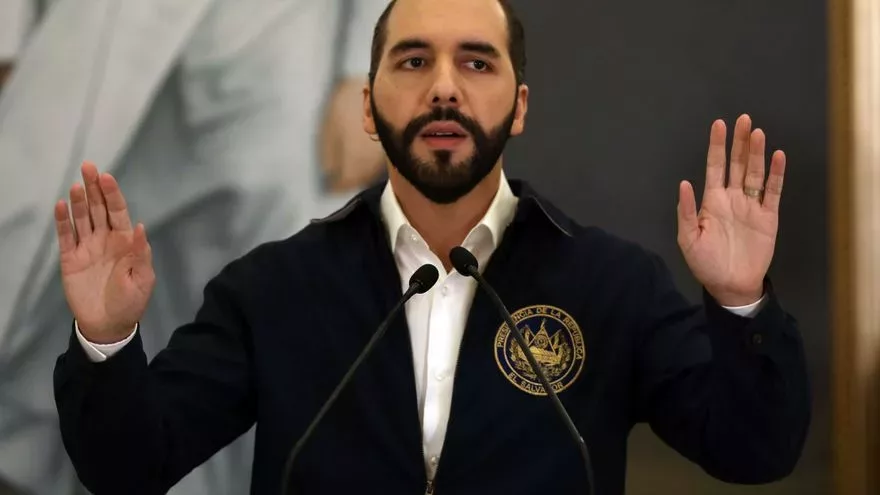“I want to die.” On the night of Tuesday, August 16, I received that message on my cell phone. It was sent to me by someone who has been hiding from the police for five months. He hides because he lives in a country where there are no judicial guarantees to prove that he is innocent. They have not existed since El Salvador entered the Emergency Regime on March 27, after a weekend in which more than 70 murders occurred. The government of Nayib Bukele decided to establish a regime to declare “war” on gangs. That war, as the authorities boast on their social networks, has resulted in the arrest of almost 50,000 “terrorists.”
Three words, a succinct as a stern message. The person who sent me this message was charged in the past. Although she was acquitted of her charges because there was never evidence to incriminate her, she is now being prosecuted again under the emergency regime for another crime. It is feared with such despair when the options run out because to submit to a process is to assume that there will be no due respect for the operation or guarantees of a fair process. And this is not only my opinion, says Amnesty International in its most recent reports. Human Rights Watch, the Due Process Foundation, and many other Salvadoran social organizations are daily saturated by complaints about human rights violations in the context of the regime. These include a long list of abuses, torture, threats, and injuries by the National Civil Police and Army agents. There is even talk of possible crimes against humanity by the State.
The Office of the Ombudsman for the Defense of Human Rights says it is investigating the deaths of 28 people inside prisons. However, social organizations have so far counted 63 people who were arrested during the regime and who have died while in prison. Many of these deaths have been reported to their relatives long after they occurred because that is another constant within this context: no one knows anything about the condition of their prison relative. No matter how much information they request, it is denied them. Even autopsies.
El Salvador: gritos desesperados en un país en Régimen de Excepción
“Me quiero morir”. La noche del martes 16 de agosto recibí ese mensaje en mi celular. Me lo envió alguien que se esconde de la Policía desde hace cinco meses. Se esconde porque vive en un país donde hoy por hoy no hay garantías judiciales para demostrar que es inocente. No existen desde que El Salvador entró bajo Régimen de Excepción el 27 de marzo pasado, luego de un fin de semana en el que hubo más de 70 asesinatos. El Gobierno de Nayib Bukele decidió instaurar un régimen para declararle “la guerra” a las pandillas. Esa guerra, como lo ufanan las autoridades en sus redes sociales, ha logrado la detención de casi 50 mil “terroristas”.
Tres palabas, un mensaje sucinto como duro. La persona que me envió este mensaje fue acusada en el pasado y aunque fue absuelta de sus cargos, porque nunca hubo pruebas que le incriminaran, ahora le vuelven a perseguir en el marco del régimen de excepción bajo otro delito. Se teme con tal desespero cuando se acaban las opciones, porque someterse a un proceso es asumir que no habrá el respeto debido por el proceso o garantías de un proceso justo. Y esta no es solo mi opinión, lo dice Amnistía Internacional en sus más recientes informes, Human Rights Watch, la Fundación para el Debido Proceso y muchas otras organizaciones sociales salvadoreñas, que a diario se saturan por denuncias que llegan sobre violaciones de derechos humanos en el contexto del régimen. Estas incluyen una larga lista de abusos, torturas, amenazas y lesiones de parte de agentes de la Policía Nacional Civil como del Ejército. Incluso, se habla ya de posibles crímenes de lesa humanidad por parte del Estado. La Procuraduría para la Defensa de los Derechos Humanos dice estar investigando la muerte de 28 personas dentro de las cárceles, sin embargo, organizaciones sociales contabilizan hasta ahora 63 personas que fueron arrestadas durante el régimen y que han fallecido mientras guardan prisión. Muchas de estas muertes han sido notificadas a sus familiares tiempo después de haber ocurrido, porque esa es otra constante dentro de este contexto: nadie sabe nada sobre la condición de su pariente que guarda prisión. Por más información que soliciten, les es negada. Incluso las autopsias.

